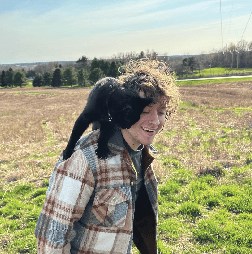Aaron Skubby, Editor-in-Chief Emeritus—
When I was in middle school, staff would hang posters in the hallways reminding students of basic inclusive language use – don’t use gay as a pejorative, don’t use the r-word, and more. For a group of angsty, immature tweens, these reminders seemed appropriate. But a few of the interactions I’ve overheard on campus recently make me question if we truly left this kind of behavior in middle school.
Though there are certainly concerns around inclusive language use for many identity groups on campus, I’ve recently been struck by how often I’ve heard students using disability as the punchline for jokes.
I consistently hear students use the r-word towards themselves or others when making some kind of poor decision. While helping facilitate the Greek New Member Academy, I heard jokes about autism more than once.
It seems to me that most people who use the r-word know that it’s wrong when called out. But as a term that alienates others and is considered by many to be hate speech, if you have a habit of using it then you should be working on removing it from your vocabulary.
One interaction that particularly stood out to me happened in Slayter. I heard a group of students mimicking the stimming of a popular TikToker known as “Darius.” Darius, whose full name is Darius Leverette, is a 16-year-old with Autism whose mother, Irisa, has gained over 1 million followers documenting her and Darius’ life.
TikTok has facilitated what I believe to be both a rise in positive representation for people with disabilities, and a rise in the ridiculing of people with disabilities.
Irisa and Darius pose a great example of positive representation. Irisa shows daily life with Darius and helps raise awareness about stimming, Autism, and more. She interacts with Darius in positive ways, and at many times the content is funny.
Life with a person with Autism can certainly be funny. We should not label the behavior of people with disabilities as universally tragic. My own brother, Jacob, has Autism. Growing up, there were definitely amusing moments. We could identify patterns in Jake’s stimming, and often talked about it.
There’s a dark side to all of this, though. It is okay to recognize the humor in living with someone with a disability – there is always comedy to be found in anyone’s life. Mocking people with disabilities is a problem. There is definitely a culture of mockery and trolling that exists towards people with disabilities on TikTok.
There are a handful of TikTok creators with disabilities who have been targeted by audiences of trolls that seek to exploit and harass the creators. For examples, check out the page titled “AIOPM” on the website “Know Your Meme.”
AIOPM is a nonsense term adopted by some to describe TikTokers with disabilities who are treated as fodder for ridicule. The attitude towards these creators is clearly not inclusive, and they are treated as the brunt of jokes that they may not be in on. It’s a clear example of laughing AT people, not with them.
People with disabilities can be funny, but the simple trait of having a disability is not inherently comedic. Using disability as the punchline of a joke is ableist and serves to other those with disabilities.
I find that positive representation is beneficial, and helps audiences learn more about disability while also enjoying wholesome content. When done well, social media can be a platform that elevates underrepresented voices.
Some critics see parents of children with disabilities as exploiting their kids for financial gain or popularity. There may certainly be cases where this is true, especially when disability is presented strictly as a form of hardship and negativity. They also argue that posting children with disabilities on social media can open them up to the potential for harassment and bullying. I take issue with this point.
If children with disabilities are faced with harassment online, the onus for change should be on the harassers. Children with disabilities should not be hidden from the public eye and ostracized because of others’ bigotry. They and their families should be able to use social media like anyone else without fear of harassment.
In the context of Denison, we shouldn’t stigmatize conversations around disability. At the same time, I question the intentions of students who use ableist language and make jokes out of people with disabilities.
I challenge students to consider how they engage with disability, both on campus and online.

